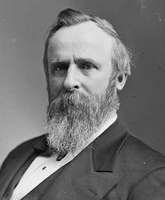Presidential election of 1876
|
|
|||||||||||||||||||||||||||||
|---|---|---|---|---|---|---|---|---|---|---|---|---|---|---|---|---|---|---|---|---|---|---|---|---|---|---|---|---|---|
|
|||||||||||||||||||||||||||||
|
All 369 electoral votes of the Electoral College 185 electoral votes needed to win |
|||||||||||||||||||||||||||||
| Turnout | 81.8% |
||||||||||||||||||||||||||||
|
|||||||||||||||||||||||||||||
|
Presidential election results map. Red denotes states won by Hayes/Wheeler, blue denotes those won by Tilden/Hendricks. Numbers indicate the number of electoral votes allotted to each state.
|
|||||||||||||||||||||||||||||
|
|||||||||||||||||||||||||||||
The United States presidential election of 1876 was the 23rd quadrennial presidential election, held on Tuesday, November 7, 1876. It was one of the most contentious and controversial presidential elections in American history. The results of the election remain among the most disputed ever, although it is not disputed that Samuel J. Tilden of New York outpolled Ohio's Rutherford B. Hayes in the popular vote. After a first count of votes, Tilden won 184 electoral votes to Hayes's 165, with 20 votes unresolved. These 20 electoral votes were in dispute in four states. In the case of Florida, Louisiana, and South Carolina, each party reported its candidate had won the state, while in Oregon one elector was replaced after being declared illegal for being an "elected or appointed official". The question of who should have been awarded these electoral votes is the source of the continued controversy concerning the results of this election.
An informal deal was struck to resolve the dispute: the Compromise of 1877, which awarded all 20 electoral votes to Hayes. In return for the Democrats' acquiescence to Hayes's election, the Republicans agreed to withdraw federal troops from the South to end the Reconstruction Era of the United States. The Compromise effectively ceded power in the Southern states to the Democratic Redeemers, who went on to pursue their agenda of returning the South to a political economy resembling that of its pre-war condition, including the disenfranchisement of black voters.
This was the first presidential election since 1852 in which the Democratic candidate won a majority of the popular vote. This is also the only election in which a candidate for president received more than 50 percent of the popular vote, but was not elected president by the Electoral College, and one of five elections (in addition to 1824, 1888, 2000 and 2016) in which the person who won the most popular votes did not win the election. To date, it remains the election that recorded the smallest electoral vote victory (185–184) and the election that yielded the highest voter turnout of the eligible voting age population in American history, at 81.8%.
...
Wikipedia




